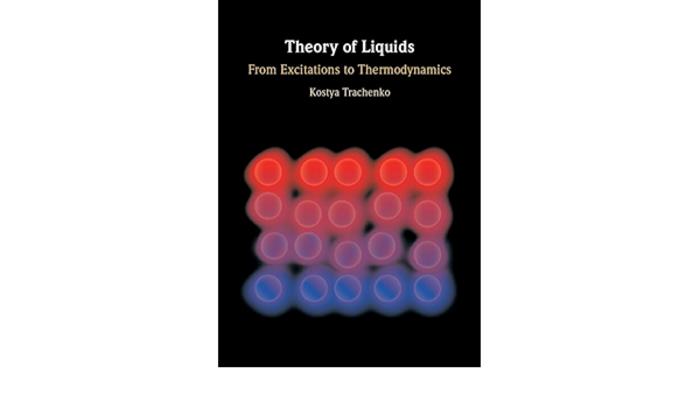Understanding solids and gases is based on theories of their most basic properties, such as energy and heat capacity. These theories were developed more than 100 years ago. On the other hand, no comparable theory of the third state of matter, the liquid state, was around until recently. This was due to the fundamental problems involved. These problems were widely discussed, for example, by Landau, Lifshitz, and Pitaevskii, stating that no general theory of liquids is possible because liquids have no small parameter. Apart from this wide theoretical gap, no general liquid theory has had adverse implications for teaching liquids to students.

Credit: Cambridge University Press
Understanding solids and gases is based on theories of their most basic properties, such as energy and heat capacity. These theories were developed more than 100 years ago. On the other hand, no comparable theory of the third state of matter, the liquid state, was around until recently. This was due to the fundamental problems involved. These problems were widely discussed, for example, by Landau, Lifshitz, and Pitaevskii, stating that no general theory of liquids is possible because liquids have no small parameter. Apart from this wide theoretical gap, no general liquid theory has had adverse implications for teaching liquids to students.
A new book by Queen Mary University of London Physics Professor Kostya Trachenko, “Theory of Liquids,” provides a theory of the most important properties of liquids, such as their energy and heat capacity. This book explains the recent developments in theory, experiment, and modeling that have enabled us to understand the behavior of excitations in liquids and the impact of this behavior on energy, heat capacity, and other basic properties.
Professor Trachenko reviews the history of liquid research, starting from the early attempts by Sommerfeld and Brillouin who were trying to understand liquids on the basis of phonons around the same time when Einstein and Debye published their papers on solids. He then shows that liquid properties can be explained on the basis of collective excitations, phonons, with an important property that the phase space available to phonons in liquids is not fixed as in solids but is instead variable. In particular, this phase space reduces with temperature, explaining the wide range of experimental results such as the reduction of liquid specific heat from the solid-like to the gas-like value with temperature.
The book surveys the liquid state and its properties across the phase diagram, including subcritical liquids, supercritical fluids, as well as viscous liquids in the glass transformation range. The book also discusses how developments in liquid theory have resulted in other unexpected insights such as the minimal quantum viscosity. This implies that liquid-based life (water-based life in our world) is well attuned to fundamental physical constants.
Liquid theory and its independent verifications focus on real liquids and their experimental properties rather than on model systems. This importantly differentiates this book from others.
“Theory of Liquids” is written in a clear and accessible style and reaches out to scientists at any stage of their career who are interested in the states of matter and the history of a long-standing problem of understanding liquids theoretically. The second group is researchers and graduate students working in the area of liquids and related areas such as physics, chemistry, and materials science. The third group is lecturers looking to include liquids in the undergraduate and graduate courses such as statistical or condensed matter physics, as well as students who can use this book as a reference.
The book is available now from Cambridge University Press: https://www.cambridge.org/gb/universitypress/subjects/physics/theoretical-physics-and-mathematical-physics/theory-liquids-excitations-thermodynamics?format=HB&isbn=9781009355476




